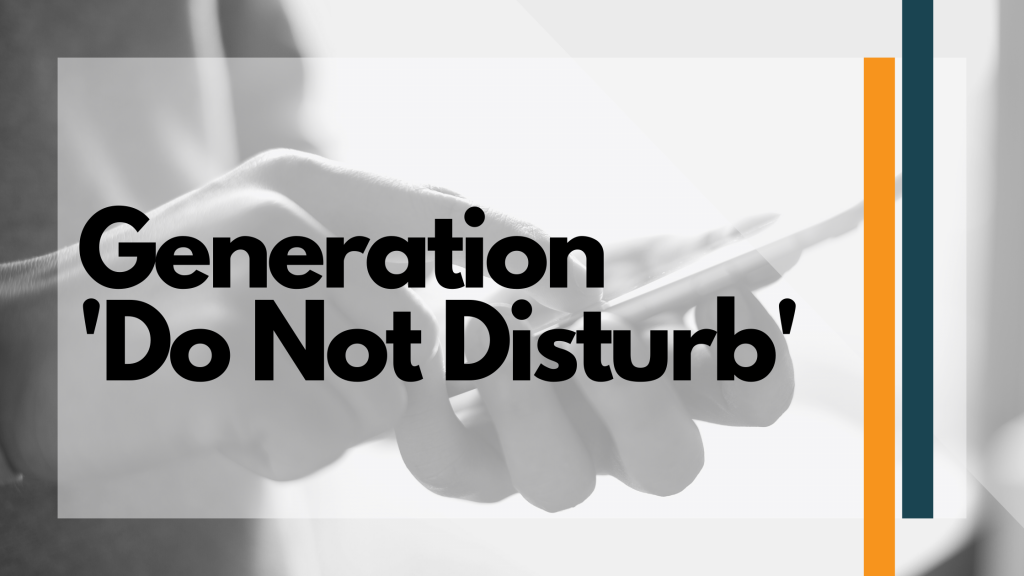Generation ‘Do Not Disturb’
Australians aren’t picking up the phone anymore. Not only have we seen this firsthand, a 2019 study revealed 87 per cent of people claim they mostly ignore or reject phone calls from businesses and unknown numbers.
As recruiters, we spend a lot of our day on the phone. Truth be told, we also spend a lot of time leaving voicemails, sending follow-up emails and texting.
While we don’t mind, in recent times we’ve seen a noticeable change: screening. There is a clear distaste for unknown phone conversations, especially in the younger generations. In our experience, people tend to ignore incoming calls to wait for a text message or voicemail to be left.
We think there are a few key reasons behind this trend.
The first reason is the number of alternative ways people can get in touch these days, from texting to messaging platforms to email and more, so calling someone for a quick question just isn’t done.
The era of spam
Another key reason is the advent of spam calls. It is believed that the reluctance to answer the phone stems from the fact that roughly 80 per cent of calls from an unknown number are telemarketers or scams.
Generation ‘DM me’
Another simple explanation is generational differences. In the past, the cultural expectation of phone ‘pick up’ was what made phones a synchronous medium, a type of cultural commons that people everywhere drew upon. If you heard the phone ring, you picked up. “Hello, Smith residence”. Anyone 30 or older grew up on with phone-call as main method of communication. Today’s generation communicates via Instagram DM’s. What on earth happened?
But let’s get real for a second, many people ridiculed the invention of the telephone before it became the single most used method of communication in business. Adapt or die?!
As different as it may be, we attach no special value to the phone call. There is no need to return to the 1980s. It’s the way of our exponentially evolving world.
Although inconvenient to old business models that relied on a phone call, we can’t fall victim to the world outpacing us. You find a new way to thrive and then you run faster than the competition. There is never a reason to be afraid of change.
This is one of those situations.
We have adapted to a model that uses additional technology like emails, texting, automated administration and so much more. Our consultants are always striving to provide tailored care to our clients and candidates, if texting makes our customers feel more at ease, then that’s what we shall do.
So how does your business adapt to the changing times?
According to a study released on eWeek, 80 per cent of people are currently using texting for business. As this has become commonplace in many offices, it’s imperative to understand the cultural context of texting. In particular, the way that different generations perceive the appropriateness of texting.
Younger generations are overly cautious of putting anyone else out. Amidst the “just quickly,”, “sorry to bother you” and “hope this isn’t too much of a pain” – millennials are taught to avoid inconveniencing others.
A digital marketing manager at Dupray Inc. says, “A text is the only form of communication that doesn’t effectively intrude on somebody else’s schedule when they are busy,” said Matthew, “You are giving the other person the opportunity to reply when they are available.”
Older generations, like Baby Boomers and Generation X, perceive texting as superfluous and improper in certain settings.
A literature review revealed that the decision to text versus call is strongly related to the generational group, with older groups preferring to talk, but the inclination to text rather than call increases as the age of the group becomes younger.
So, how can your business successfully integrate texting as a means of communication in the office?
The first step is to give transparency on office texting policies.
Texting does have its draw backs, so employers should be cautious on where texting is employed. For example, an urgent or pressing matter should not be solved through a text or email.
Employers also need to be cautious of employee distraction or group chats becoming unintended outlets for workplace bullying. To avoid any issues, we recommend you clearly define the expectations for personal messaging in the office.
It’s also worth being very in-tune with this generational communication difference when communicating with clients and candidates. Learning to adapt communication methods to the audience can be an incredibly effective when improving corporate relations.
Baby Boomers that go out of their way to send a text rather than place a disruptive phone call can earn respect from Millennials, just as Millennials that pick up the phone to build a relationship rather than send a cold email will likely enhance their business relationship as well.
Once that’s out of the way, embrace texting!
Evidence shows there are a lot of benefits to digital interaction between employees, customers and clients. Digital interactions look to create camaraderie, this shows a direct increase in consumer engagement by 700 per cent.
As Steve jobs once said, “Let’s go invent tomorrow, rather than worrying about what happened yesterday”.
For more expert advice, check out our monthly blog issues on our website.






